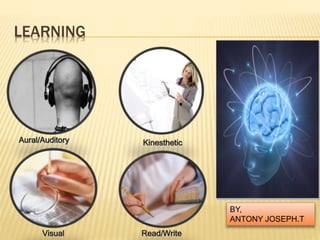Learning Theories
•Als PPTX, PDF herunterladen•
1 gefällt mir•3,181 views
Melden
Teilen
Melden
Teilen

Empfohlen
Weitere ähnliche Inhalte
Was ist angesagt?
Was ist angesagt? (20)
Andere mochten auch
Andere mochten auch (10)
IMPACT OF CELEBRITY ENDORSEMENT ON CONSUMER BUYING BEHAVIOUR

IMPACT OF CELEBRITY ENDORSEMENT ON CONSUMER BUYING BEHAVIOUR
Ähnlich wie Learning Theories
Ähnlich wie Learning Theories (20)
Classical Conditioning and Operant Conditioning.ppt

Classical Conditioning and Operant Conditioning.ppt
Principles and Applications of Classical and operant conditioningppt.pptx

Principles and Applications of Classical and operant conditioningppt.pptx
Final-Learning-Theories-Related-to-Healthcare-Practices.pptx

Final-Learning-Theories-Related-to-Healthcare-Practices.pptx
BEHAVIORISM.PPT in Facilitating Learner Centered Teaching.pptx

BEHAVIORISM.PPT in Facilitating Learner Centered Teaching.pptx
Kürzlich hochgeladen
APM Welcome
Tuesday 30 April 2024
APM North West Network Conference, Synergies Across Sectors
Presented by:
Professor Adam Boddison OBE, Chief Executive Officer, APM
Conference overview:
https://www.apm.org.uk/community/apm-north-west-branch-conference/
Content description:
APM welcome from CEO
The main conference objective was to promote the Project Management profession with interaction between project practitioners, APM Corporate members, current project management students, academia and all who have an interest in projects.APM Welcome, APM North West Network Conference, Synergies Across Sectors

APM Welcome, APM North West Network Conference, Synergies Across SectorsAssociation for Project Management
Kürzlich hochgeladen (20)
Kisan Call Centre - To harness potential of ICT in Agriculture by answer farm...

Kisan Call Centre - To harness potential of ICT in Agriculture by answer farm...
A Critique of the Proposed National Education Policy Reform

A Critique of the Proposed National Education Policy Reform
Call Girls in Dwarka Mor Delhi Contact Us 9654467111

Call Girls in Dwarka Mor Delhi Contact Us 9654467111
Beyond the EU: DORA and NIS 2 Directive's Global Impact

Beyond the EU: DORA and NIS 2 Directive's Global Impact
BAG TECHNIQUE Bag technique-a tool making use of public health bag through wh...

BAG TECHNIQUE Bag technique-a tool making use of public health bag through wh...
Ecosystem Interactions Class Discussion Presentation in Blue Green Lined Styl...

Ecosystem Interactions Class Discussion Presentation in Blue Green Lined Styl...
APM Welcome, APM North West Network Conference, Synergies Across Sectors

APM Welcome, APM North West Network Conference, Synergies Across Sectors
Learning Theories
- 2. The acquisition of knowledge or skills through experience, practice, study, or by being taught. e a r n i n g Relatively permanent change in behaviour due to experience
- 3. DEFINITIONS Learning refers to a more or less permanent change in behavior which occurs as a result of practice. (G.A.Kimale, 1961) Consumer learning is the process by which individuals acquire the purchase and consumption knowledge and experience they apply to future related behaviour. (Schiffman and Kanuk)
- 4. CONSUMERS LEARNING ACTIVITY Motivation Stimuli and Cues Response Reinforcement
- 5. CLASSIFICATION OF LEARNING THEORIES LEARNING Behavioral Cognitiv e Classical Conditionin g Operant Conditioning
- 6. WHAT IS LEARNING? Behavioral Perspective A relatively permanent change in behaviour that arises from practice or experience Cognitive Perspective Mental change that may or may not be associated with changes in behaviour
- 7. TYPES OF BEHAVIORAL LEARNING Classical conditioning: learning to link two stimuli in a way that helps us anticipate an event to which we have a reaction Operant conditioning: changing behavior choices in response to consequences
- 8. CLASSICAL CONDITIONING Ivan pavlow 1849-1936 Russian physiologist Proponent of classical conditioning
- 9. LEARNING TO MAKE AN INVOLUNTARY (REFLEX) RESPONSE TO A STIMULUS OTHER THAN THE ORIGINAL, NATURAL STIMULUS THAT NORMALLY PRODUCES THE REFLEX. A Reflex is an unlearned, involuntary response that occur under personal control or choice The food causes a particular reaction, the SALIVATION. A STIMULUS can be defined as any object, event or experience that causes a response, the reaction of an organism. DEFINITION
- 10. PAVLOV AND THE SALIVATING DOGS Pavlov discovered that his dogs began salivating when they weren't supposed to be salivating. Switching his focus, Pavlov spent the rest of his career studying on what he termed Classical Conditioning, learning to elicit an involuntary reflex response to a stimulus other than the original stimulus that produces reflex.Elements of Classical Conditioning: Unconditioned Stimulus (UCS). Unconditioned Response (UCR) Conditioned Stimulus (CS) Conditioned Response (CR)
- 11. UNCONDITION ED STIMULUS The original naturally occurring stimulus. This is the stimulus that ordinarily leads to the reflex response. In the case of Pavlov dogs, the food is the unconditioned stimulus. UNCONDITION ED RESPONSE The reflex response to the unconditioned stimulus. It is unlearned and occurs because of genetic ‘wiring’ in the nervous system. In Pavlov’s experiment, the salivation to the food is the UCR. CONDITIONED STIMULUS Pavlov determined that almost any kind of stimulus could become associated with UCS. The sight of the food dish itself became a stimulus for salivation before the food was given. At this point, the dish was called NEUTRAL STIMULUS. CONDITIONED RESPONSE Comes as a response to the conditioned stimulus.
- 13. OPERANT CONDITIONING B.F.Skinner (1904 – 1990) Psychologist Proponent of operant conditioning
- 14. The kind of learning that applies to voluntary behavior through the effects of pleasant and unpleasant consequences or responses. OPERANT CONDITIONING
- 15. •The rat is learning to press the bar in the wall of the cage in order to get food . B.F. SKINNER: THE BEHAVIORIST Skinner box Studied observable, measurable behavior. • learning depends on consequences Recording deviceBar or lever that an animal presses, randomly at first, later for reward Food/water dispenser to provide the reward
- 16. COGNITIVE LEARNING THEORY Learning is a function of exerting the mind. DEFINITION
- 17. KEYPOINTS OF THIS THEORY Thinking, memory, knowing, as well as problem-solving need to be explored. We can view knowledge as a schema (symbolic mental construction). Learning: change in a learner’s schemata. People need active participation, that is how we learn, and our actions are a consequence of thinking.
- 18. COMPONENTS OF HUMAN MEMORY
- 19. CONCLUSION It is very important for the marketers to know how consumers learn about their role as consumers and about various products.
- 20. REFERENCES S.A.Chunwalla, Commentary on Consumer Behaviour, Millenium publishing house,2000. Schiffman and kanuk, Consumer Behaviour, 8th edition, Prentice hall of india, NewDelhi,2004. www.scribd.com www.slideshare.net